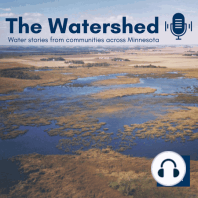15 min listen
38 | Local Waters, Somali Perspectives (Minneapolis, MN)
FromThe Watershed
ratings:
Length:
12 minutes
Released:
Jul 28, 2023
Format:
Podcast episode
Description
The We Are Water MN exhibit is on its 2023 tour and will be visiting five communities in the state of Minnesota: Becker (Mississippi River - St. Cloud Watershed), Pine River, Minneapolis (Somali Museum), Roseau and Stillwater.
We Are Water MN is currently hosted by the Somali Museum of Minnesota. You can view the exhibit at Augsburg University's Oren Gateway Center in Minneapolis, MN from June 22nd through August 14th. Learn more at Minneapolis - We Are Water MN - Minnesota Humanities Center (mnhum.org)
We are Water MN is led by the Minnesota Humanities Center in partnership with the Minnesota Pollution Control Agency; the Minnesota Historical Society; the Minnesota Departments of Agriculture, Health, and Natural Resources; the Minnesota Board of Water and Soil Resources, and University of Minnesota Extension, with support from the Clean Water, Land & Legacy Amendment, and the National Endowment for the Humanities.
Special thanks to our interviewer Leah Lemm, and our interviewees featured in this episode: Maryen Hersi, Maryan Yusuf and Hodan Hassan. Additional thanks to the Somali Museum and Khadijo Abdi, for their additional aid in interviewing, translating and narrating.
To learn more about We Are Water MN, visit us at our website or follow us on Facebook and Twitter.
We Are Water MN is currently hosted by the Somali Museum of Minnesota. You can view the exhibit at Augsburg University's Oren Gateway Center in Minneapolis, MN from June 22nd through August 14th. Learn more at Minneapolis - We Are Water MN - Minnesota Humanities Center (mnhum.org)
We are Water MN is led by the Minnesota Humanities Center in partnership with the Minnesota Pollution Control Agency; the Minnesota Historical Society; the Minnesota Departments of Agriculture, Health, and Natural Resources; the Minnesota Board of Water and Soil Resources, and University of Minnesota Extension, with support from the Clean Water, Land & Legacy Amendment, and the National Endowment for the Humanities.
Special thanks to our interviewer Leah Lemm, and our interviewees featured in this episode: Maryen Hersi, Maryan Yusuf and Hodan Hassan. Additional thanks to the Somali Museum and Khadijo Abdi, for their additional aid in interviewing, translating and narrating.
To learn more about We Are Water MN, visit us at our website or follow us on Facebook and Twitter.
Released:
Jul 28, 2023
Format:
Podcast episode
Titles in the series (59)
Beautiful Homes, Nice Yards by The Watershed
